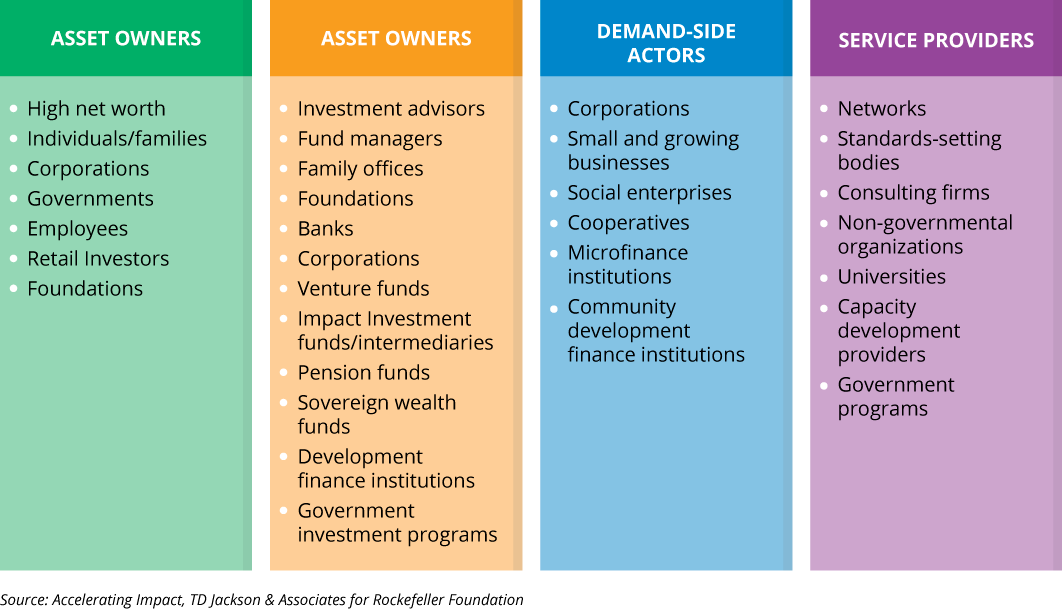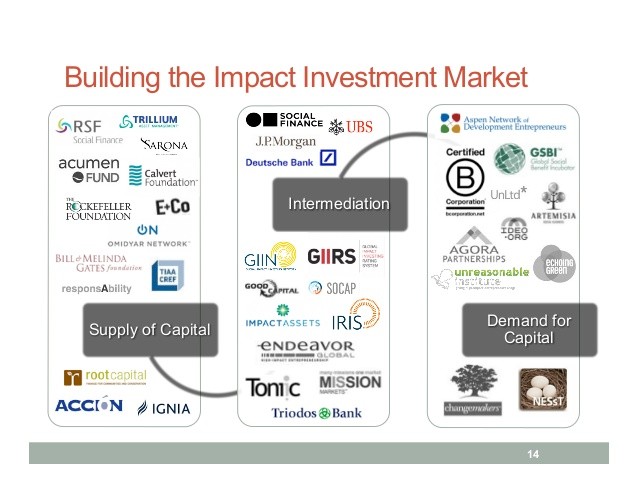The Supply of Money MaRS Centre for Impact Investing
Post on: 11 Июнь, 2015 No Comment

The Supply of Money
Some of Canada’s financial institutions have played a leading role in advancing the field of impact investing. Amongst them, Royal Bank of Canada’s Impact Generator fund will be investing $10 million in clean-tech and water companies, as well as job-creation initiatives. Credit unions across Canada also provide loans, grants and micro-finance products to businesses and organizations working in the fields of aboriginal banking, local and organic food, affordable housing, energy and the environment, and social purpose real estate.
Examples:
A founding leader in developing Quebecs social economy. The Caisse déconomie solidaire: Desjardins finances cooperatives, not-for-profits and community based initiatives.
Vancity. Canada’s largest credit union, has adopted a leading role in Canada’s social finance sector by continuously exploring new ideas to complement foundation funding efforts. It holds over $14.5 billion in assets.
Vancity Community Capital is a social finance leader specializing in providing growth capital and patient capital to small- and medium-sized businesses and social enterprises based in British Columbia. It has financed over 200 businesses and social enterprises since its formation over a decade ago. A triple-bottom line approach is used to evaluate social finance deals.
Community loan funds are small loan programs directed to an underserved population in a community with the intention of contributing to the wider prosperity of the geographical region. Over 40 local community loan programs can be found across the country in our Directory of Funds .
Further examples:
The Canadian Alternative Investment Co-operative (CAIC) provides mortgages for community-based projects operated by non-profits and charities, supporting them to own the physical infrastructure that house their social programs. CAIC extends equity investments and low-interest loans to non-profits, charitable organizations, social and affordable housing initiatives, and social enterprises.
The Ottawa Community Loan Fund provides micro loans of up to $15,000 to businesses and social enterprises that have experienced challenges accessing loan supports elsewhere. The fund’s purpose is to ‘encourage self-employment, self-reliance, and build a stronger community’.
The Edmonton-based Social Enterprise Fund provides small grants and term loans (including bridge financing) to charities and non-profits, to support the development of social enterprises and affordable housing projects.
The Fiducie du Chantier de l’économie sociale provides 15-year loans of between $50,000 and $1.5 million for social enterprises in Quebec that require financing for working capital, new product launches, equipment purchases, or building acquisition, renovation or construction.
Youth Social Innovation Capital Fund provides loan financing to young social entrepreneurs and made its first loan to Fresh City Farms in 2013.
The Canadian Task Force on Social Finance recommends that Canadas public and private foundations invest at least 10% of their capital in mission-related investments (MRI) by 2020 and report annually to the public on their activity. When this recommendation is fulfilled, it will mobilize $3.4 billion to align foundation investment with their public benefit mission.
Community Foundations of Canada (CFC) is playing a lead role in collecting best practices and designing systems for MRI, so that as many foundations as possible can participate.

A growing number of private equity funds in Canada are focusing on impact investing,
Further examples:
Investeco is Canada’s first environmental investment company. It currently manages over $40 million for over 100 Canadian investors in ventures that support renewable energy, sustainable agriculture and clean technologies.
Renewal 2 is a British Columbia loan fund for North American businesses seeking early stage financing of between $250,000 and $1.5 million. The fund focuses on organic and natural foods, green consumer products and green building products. This fund focuses on supporting businesses offering everyday products and services in new and innovative ways that help change basic consumption behaviour.
MaRS Cleantech Fund is privately-backed $30 million fund that provides early-stage funding to companies developing next-generation cleantech breakthroughs with deep IP, global markets and a capital-lean business model.
Resilient Capital makes debt and equity investments in social enterprises, enabling enterprises to address social and environmental challenges and build resilient communities. The program is funded by Vancity and Vancouver Foundation based on Resilient Capital Term Deposits from third party supporters (Deposit Investors).
The Capital for Aboriginal Prosperity and Entrepreneurship (CAPE) Fund is a $50 million private sector investment fund initiated by the family of the Right Honourable Paul Martin and 21 of Canada’s leading companies, individuals and international foundations. Equity and quasi-equity investment is made by CAPE in diverse industries and regions, with a view to fulfilling its mission of promoting entrepreneurial values among Aboriginal people.














